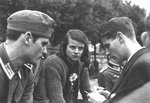but killing your own countrymen is treason...
Not necessarily. Because of Hitlers complete disregard for human life and his desire to destroy Germany (He may not have seen it this way but that is what it comes down to) and the rest of Europe along with it, killing him would not have been an act of treason. There were eneogh people that would have stood by that person.

